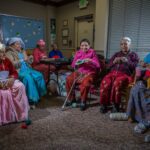Background: Unaccompanied refugee minors (URM) are at significantly higher risk of trauma exposure and mental illness. Research examining the most effective treatments for this population is limited. Aims: To study the available research evidence on outcomes from various group interventions in this population. The objective is to investigate if these can be used clinically in future interventions. Methods: Systematic review was carried out for patient outcomes where group therapy was used as treatment in URM. Studies with ARM (Accompanied refugee minors) were included because of similarities between these groups and because many studies were mixed population. Results: Seventeen papers met eligibility criteria with a total of N = 1,119 participants. About 80% studies with a quantitative component reported improvements, and 69% of the studies that carried out statistical analyses reported statistically significant improvements in mental health symptoms. Every qualitative measure reported positive outcome for the participants. Studies with URM tended to show improved outcomes more often than studies exclusively with ARM. Conclusions: The evidence demonstrates the efficacy of group therapy in improving mental health outcomes, although the number of studies with robust methodology is small. Group intervention has potential to improve engagement and outcomes of URM with mental illness. Future direction for research is discussed.
A Systematic Review on the Impact of Trauma-Informed Education Programs on Academic and Academic-Related Functioning for Students Who Have Experienced Childhood Adversity
The purpose of this study was to conduct a systematic review of the existing literature regarding trauma-informed education programs and their impact on academic and

